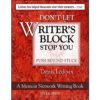A major obstacle you may face when prodded to devote yourself to “improving your writing” as you contemplate writing a memoir is that you, as do most people, know how to write.
By “know how to write,” I don’t mean to convey people know how to compose a long-form literary work but that they know how to write shopping lists, enotes, social media posts and sometimes even letters.
Most people in the Western World know how to write—that is, to string words together in a semi-legible and semi-literate manner. Unfortunately, we use the same word for the process of composing a memoir.
But, writing a memoir calls for more than spelling and grammar. It calls for the ability, generated by discipline, to both manage one’s reactions to writing—what some people call the “inner game”—and to handle the requirements of writing’s best practices—the “outer game.”
Both are necessary to improving your writing.
Best writing practices
In this category I am presenting best writing practices of the outer game of writing.
Of course, there is clearly a factor of “inspiration” of some sort in mot successful pieces of writing, but I am wary of emphasizing inspiration, which too many people believe is the key to a successful piece of writing, as it is different from enthusiasm.
Most of us start to write with some enthusiasm. That is great. However, what will ultimately sustain your writing and make improving your writing possible, is knowledge and skill of best writing practices.
By best practices, I refer to techniques used by writers to steer and enhance reader reaction and to keep the reader reading.
In conclusion
Work on improving your writing. The posts below—as all the posts on this blog—will help you to do just that.
Find here many tips and theories about improving your craft. You will learn much to make your memoir more meaningful and more interesting.
Your memoir and your readers will thank you.

Your Memoir: an Arrest of Disorder
When I read the quote above, I did not have to make much of a leap to sense that the words “An arrest of disorder” apply to the task you and I undertake when we write memoir. More than anything perhaps, we want an arrest of disorder. Disorder seems to be everywhere in life. And […]

Don’t Use A Writing Prompt Unless…
You read the piece written from a writing prompt to your writing group or post it to a forum and people comment about how clever you are and how important it is to write with humor. “Make things funny,” they say. But… Have you plumbed the memory that would give your memoir depth?

Ten Questions On Memoir Writing
(The following interview appeared in the Nov. 19, 2010, Oral History Education blog.) How did you get started in your profession of memoir writing? I started writing autobiography-based fiction. Some of these have won literary awards, and, while I like that, I feel the most satisfaction from helping readers who are stimulated to tell their […]

Three Causes of “Writer’s Block”
Many writers suffer from writer’s block, yet few understand its possible causes. Memoir writing certainly has its difficulties which can cause writer’s block.

Rework Your Story to Get More Show and Less Tell
There are ways to rework your stories so that you can minimize “telling” and maximize “showing.” The biggest “telling” offense is perhaps…

Avoid Cliches and Stereotypes
You can avoid cliches and stereotypes. If you do not avoid cliches and stereotypes, you will undermine the unique and personal feel of your memoir. Cliches and stereotypes place people in often erroneous and certainly indefensible categories.

Three Tips For Using Fiction Techniques in a Memoir
We all love well-told stories. We love the entertainment, the sound effects, the punchy plot built around solid characterization. As we share stories in our everyday conversations, we inevitably use fiction techniques to keep our listeners’ attention and interest. When we say “And then she said…,” we are using dialogue – that’s a fiction technique.

Not Being Preachy: Four Tips
The negative underside of theme is being preachy. You are preaching when you insist that your reader endorse your theme, message or point of view.

Writing Effective and Interesting Dialog
Dialog allows the reader to hear the voice of the character. It is an opportunity to use regionalisms and particularities of speech. Even to write in pauses if that was typical of the person. “Ain’t much wrong with it,” my grandfather would say…
